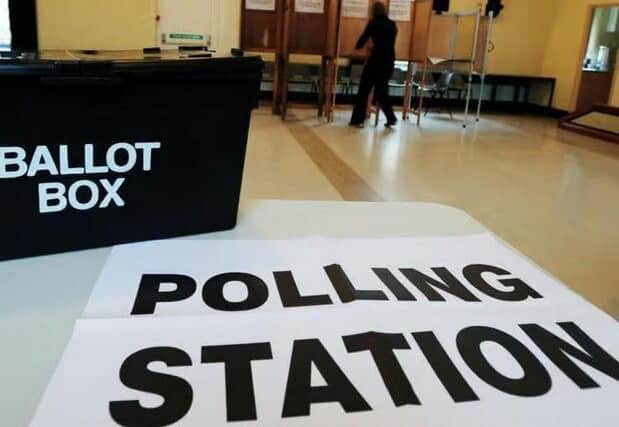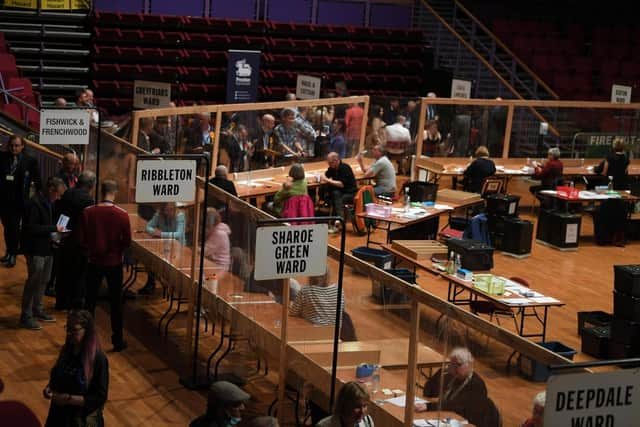Fears photo ID rules will make voting difficult for some at Preston's local elections – and could cause punch-ups at the polls
and live on Freeview channel 276
There were calls for new photo ID rules to be scrapped amid cross party condemnation of a system being rolled out nationwide in time for the May 2023 poll - as well as claims that the new arrangements might even spark violence if registered electors are aggrieved at being turned away.
The deputy leader of Preston City Council told a meeting of the authority that the controversial changes amounted to “demographic gerrymandering”. Martyn Rawlinson was speaking during a debate on what councillors claimed were the dangers of sweeping away the current right of residents to cast their vote without having to prove that they are who they say they are.


Advertisement
Hide AdAdvertisement
Hide AdAt the moment, voters simply provide their name and address before being pointed towards the pencil that gives them the power to help decide who represents them.
However, from next year, some form of photographic identity will be demanded at polling stations before democracy can be done in all local, parliamentary and police and crime commissioner elections and any referendums. .
Driving licences, passports and bus passes are amongst the documents that will be accepted - and those without any suitable form of ID can apply in advance for a new “voter authority certificate”
But Cllr Rawlinson said that the last-minute implementation of that safety net will leave councils under pressure to ensure that it works at a local level.


Advertisement
Hide AdAdvertisement
Hide Ad“The details of the supposed free scheme to get photo ID for everyone have not fully come out yet…[and] it could be a huge task if [they emerge] any later,” he warned, stressing that town hall staff would nevertheless strive to meet the challenge as they had during previous electoral law changes requiring individual voter registration.
However, the Labour politician condemned the overall concept of voter ID, which the city council officially opposes following a previous resolution on the subject.
“The rules that have come out on what photo ID you can use includes older people’s bus passes - so most older people will be okay.
“But lots of young people - if their family doesn't holiday abroad [or] they can’t afford to learn to drive [and so have] not applied for a provisional licence - just don't have photo ID.


Advertisement
Hide AdAdvertisement
Hide Ad“The legislation is completely unnecessary, it's utterly disproportionate…[and] it’s effectively demographic gerrymandering.
“There was a local Conservative candidate bragging last year on Twitter that Labour were terrified of voter ID and that it was going to change elections - so it's nasty stuff,” Cllr Rawlinson added.
David Borrow, the city’s cabinet member for planning and regulation - and a former South Ribble MP - warned that elderly parts of the population would not be immune from the problems that could be caused by the new ID requirements.
He said that by the time his own mother passed away, when she was in her late 90s, she had “given up her bus pass because she couldn't get on the bus, she didn't have a passport because she’d stopped going abroad, she never drove [and so] never had a driving licence - and yet she always voted”.
Advertisement
Hide AdAdvertisement
Hide Ad“If this had been in place [during her lifetime], she would have found it very difficult - given her age and everything else - to make sure she voted in every election,” said Cllr Borrow, who likened the changes to “classic voter suppression” techniques.
The government has said that there is no room for complacency when it comes to the risk of electoral fraud and that it is extensively testing the system that will support applications for voter authority certificates to ensure that it is safe and secure.
However, Preston City Council’s Conservative opposition group leader, Sue Whittam, also spoke out against the plans, saying that the local party would be lobbying against them.
“A lot of people have concerns about this, including us. it is unfair and definitely shouldn't be coming in at this time,” Cllr Whittam told the meeting.
Advertisement
Hide AdAdvertisement
Hide AdRibbleton ward councillor Jonathan Saksena - one of two members to ask questions that prompted the debate on the subject - said that he suspected fraudulent voting would affect “something like [nought] point zero zero…of a percent” of votes cast and claimed that ”exaggerating this level of fraud is an insult to the electorate, the vast majority of them [being] perfectly honest”.
Cllr Rawlinson said that he was not aware of any voter fraud in Preston and he believed that the issue was being “used” by some politicians to justify voter ID.
Allegations of voter impersonation in Pendle were investigated by that Lancashire authority and the police in 2018.
Preston's Liberal Democrat group leader, John Potter - who first raised the issue at the meeting - said that there had been just four convictions for electoral fraud in the UK over the last ten years, during which over 240 million votes had been cast.
Advertisement
Hide AdAdvertisement
Hide AdHe also warned that there was insufficient time to undertake a proper public awareness campaign of the “despicable” new rules, which he said - when trailed across the UK - saw a third of people not bothering to return with the necessary ID when they were refused a vote on their initial visit to the polling station.
Cabinet member for the environment and community safety Robert Boswell said that the arrangements could trigger anger that would be directed at polling station staff - not only from those who turn up without any ID, but also anybody whose proof was questioned.
“[They]...have to sit there and make a decision on whether that photo ID is that person [in front of them] - and that could lead to some traumatic experiences, [causing] arguments [and] violence. It’s unworkable,” Cllr Boswell warned.
Meanwhile, Ashton ward member James Hull told fellow councillors that introducing photo ID would undermine the work that the city council had done “over many years…to engage as many of the electorate as we can”.
Advertisement
Hide AdAdvertisement
Hide Ad“[The new policy] is especially bad [for] the poorest people in society, the people who are moving [addresses] a lot, disabled people [and] people from other countries who might not understand how to [secure] their enfranchisements and rights to vote.
“I and anybody of a right mind…should be trying to encourage our people to vote and not putting any blocks or fetters in the way of that,” said Cllr Hull, who added that the changes were also a “total and utter waste of money” during tough economic times.
Responding to the issues raised at the Preston City Council meeting, a government spokesperson said: “We cannot be complacent when it comes to ensuring our democracy remains secure.
“Everyone eligible to vote will have the opportunity to do so and 98 percent of electors already have an accepted form of identification.
Advertisement
Hide AdAdvertisement
Hide Ad“Photo identification has been used in Northern Ireland elections since 2003 and we’re working closely with the sector to support the rollout and funding the necessary equipment and staffing.”
WHAT WILL I NEED TO VOTE?
The following documents will be accepted as long as poll workers assess the photo is a good enough likeness of the person attending the polling station:
***A passport issued by the UK, any of the Channel Islands, the Isle of Man, a British Overseas Territory, an EEA state or a Commonwealth country
***A driving licence issued by the UK, any of the Channel Islands, the Isle of Man or an EEA state.
***A biometric Immigration document
Advertisement
Hide AdAdvertisement
Hide Ad***An identity card bearing the Proof of Age Standards Scheme hologram (a PASS card)
***Ministry of Defence Form 90 (Defence Identity Card)
***A Blue Badge
***A national identity card issued by an EEA state
***An older person’s bus pass
***A disabled person’s bus pass
***An Oyster 60+ card
***A Freedom Pass
***A new voter authority certificate or a temporary voter authority certificate
Expired documents, such as passports, will also be accepted.
Source: Electoral Reform Society
THE PROS AND CONS OF VOTER ID
The Electoral Commission has long recommended that ID should be required in Great Britain before voters are issued with a ballot paper. It published a report on delivering and costing a voter ID scheme back in 2015.
Advertisement
Hide AdAdvertisement
Hide AdOne of its key assumptions was that photo ID would be required, but the commission also cautioned that accessibility was crucial and said that any scheme should be backed up by a free voter card for those without an alternative.
A year later, the government’s then anti-corruption Champion, Lord Eric Pickles, issued a report on electoral fraud. That highlighted the trust-based nature of polling station voting and recommended that the government should consider voter ID.
However, the Electoral Reform Society last week warned that the list of photo ID options are “predominantly those held by older people”, prompting concern that younger people will find it comparatively harder to vote.
The organisation had campaigned for a wider list of identity documents to be included - including student IDs, library cards and bank statements. But when that list was put forward in an amendment to the Elections Act during its passage through the House of Lords, it was rejected by the government for not being sufficiently secure.
Advertisement
Hide AdAdvertisement
Hide AdThe Local Government Association has said that the changes should be postponed until a “fail safe” system is in place.
Its Tory chair, Cllr James Jamieson, said: “While we accept that voter ID has now been legislated for, electoral administrators and returning officers should be given the appropriate time, resource, clarity and detailed guidance to implement any changes to the electoral process without risking access to the vote.
“We are concerned that there is insufficient time to do this ahead of the May 2023 elections. We support the Gould Principle whereby electoral law should not be changed within six months of an election that the change would impact.
“The new voter ID requirements would have a number of implications for councils, such as a review of polling stations, and where necessary finding new venues in time for May’s elections.
“We also have concerns over the readiness of new IT systems, being able to properly test these and ensure staff receive training.”
